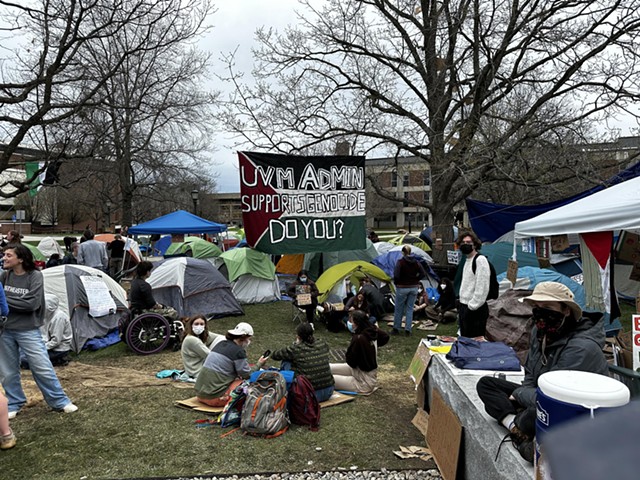
- File: Colin Flanders ©️ Seven Days
- The encampment
U.S. Ambassador to the United Nations Linda Thomas-Greenfield was "impressive and deserving" of the honor, he assured one of her colleagues at the U.S. State Department, emails obtained by Seven Days show.
But just four days later, UVM pulled the plug on Thomas-Greenfield’s visit, joining the ranks of universities that altered graduation plans this spring amid a wave of campus activism.
UVM officials have said only that the decision was made jointly between Garimella and the State Department. In response to a request for email records, the university provided heavily redacted messages that shed little light on the specific chain of events. A university spokesperson said on Monday night that Garimella would not be available for an interview on Tuesday.
Planning for the 2024 commencement ceremony began more than a year ago, well before Hamas' surprise October 7 attack on Israel. The search involved an assist from former U.S. senator Patrick Leahy, the emails show. Leahy told Seven Days on Monday that the university asked for his help in contacting a list of several nationally known candidates. They included Thomas-Greenfield, whom Leahy said he personally thought was a great pick. She spent 35 years in the U.S. Foreign Service.
“Here was a person who joined the State Department at a time when it was not that welcoming to women, especially women of color, and she broke through those barriers,” Leahy said.
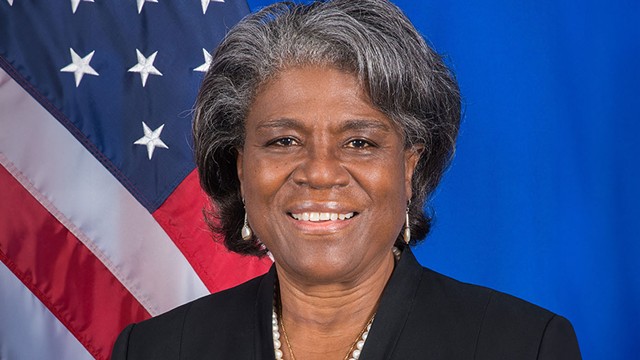
- Courtesy
- Linda Thomas-Greenfield
The group noted in social media posts that Thomas-Greenfield had voted against a humanitarian pause to Israel’s bombardment of the Gaza Strip, and it blamed her for the war's rising death toll.
“UVM’s inviting of a war criminal genocidaire to campus is a disgraceful spit in the face to graduating seniors, Palestinian students, and the entire student body,” the group posted on April 26. The encampment sprung up two days later, and on April 29 demonstrators held a rally calling for graduates to walk out of commencement.
Garimella didn't seem moved by those threats, emails show.
Hours after the April 29 rally, the president exchanged emails with Mark Libby, the U.S. ambassador to Azerbaijan, whose son was set to graduate from UVM this spring. Libby had contacted the school to express support for Thomas-Greenfield’s visit, and Garimella wanted to thank him for his feedback.
“Over a year ago, when I was looking at prospective Commencement speakers, none seemed as impressive and deserving as her,” Garimella wrote to Libby on April 29. “We are, of course, making all the needed security arrangements, and I have no intention of cancelling campus speakers in general, much less her speech.”
UVM had, in fact, shown itself willing to revoke the invitation of controversial speakers in the past. In October, just two weeks after the attack on Israel, the university canceled a lecture by Mohammed El-Kurd, a Palestinian poet and correspondent for the Nation, citing vague safety concerns. Emails later provided to Seven Days showed no threats were made and that some professors were upset by the decision.
Related Records Show UVM Professors Questioned Decision to Nix Palestinian Writer’s Appearance
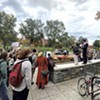
Records Show UVM Professors Questioned Decision to Nix Palestinian Writer’s Appearance
Education
“That’s especially important when times are tough and disagreements are sharp, but your approach is consistent with our impressions of UVM over the past four years our [son] has studied there,” Libby wrote.
The university and Thomas-Greenfield's staff do not appear to have communicated by email about her speech in the week after it was announced. But on April 30, a day after the public call for a walkout, the ambassador’s chief of staff emailed the university asking for a phone call about commencement. On May 3, the speech was canceled. Xavier University in New Orleans withdrew its invitation to Thomas-Greenfield that same week, citing student objections.
Seven Days submitted a public records request on May 6 seeking emails from the previous month on the topic of the commencement speaker involving three UVM officials: Garimella, provost Patricia Prelock and vice provost for student affairs Erica Caloiero. The paper also sought correspondence between UVM and Thomas-Greenfield's staff.
UVM took nearly a month to respond, far longer than the public records law allows. When it finally fulfilled the request, it provided only 19 pages, including some emails that were entirely blacked out. The records did not appear to contain any emails sent to or from Prelock and Caloiero, though both were heavily involved in the university's response to the encampment.
The redactions make it impossible to know whether the two sides discussed in writing what led to the decision to cancel the speech. But the emails show that the university consulted with the State Department on how the news should be worded. The final announcement wound up as a single sentence buried in a lengthy campus-wide email from Garimella that offered no explanation for the change.
"It is with regret that I share that our planned speaker, Ambassador Linda Thomas-Greenfield, will not be joining us to deliver the Commencement address," Garimella wrote in the message, which was sent at 6 p.m. on a Friday.
The next day, Garimella emailed Libby again and linked to his statement. “Much thinking and many consultations with the ambassador’s staff went into this,” he wrote. “Certainly not something I would have wanted, but seems the best we could do.”
"I do not envy the balancing act you have to perform to ensure that all sides feel heard and safe, that debate and disagreement remain both open and respectful, and that commencement can take place smoothly," Libby responded. "Even in the best of times, this is a tall order."




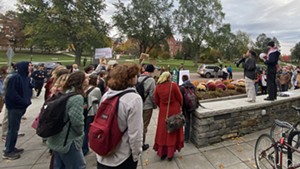





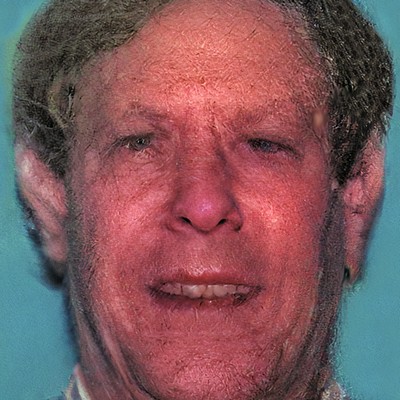
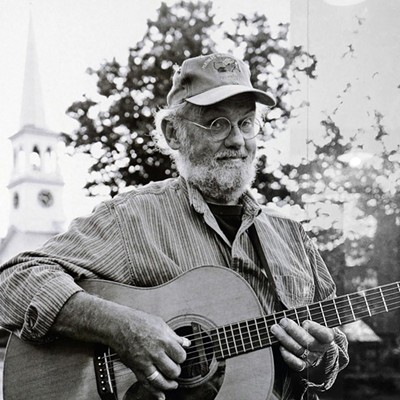
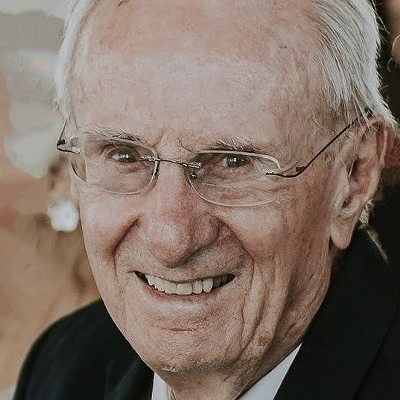
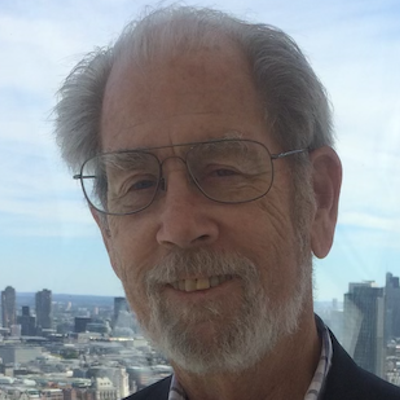
Comments
Comments are closed.
From 2014-2020, Seven Days allowed readers to comment on all stories posted on our website. While we've appreciated the suggestions and insights, right now Seven Days is prioritizing our core mission — producing high-quality, responsible local journalism — over moderating online debates between readers.
To criticize, correct or praise our reporting, please send us a letter to the editor or send us a tip. We’ll check it out and report the results.
Online comments may return when we have better tech tools for managing them. Thanks for reading.